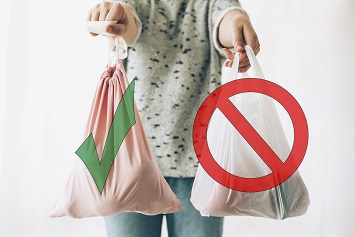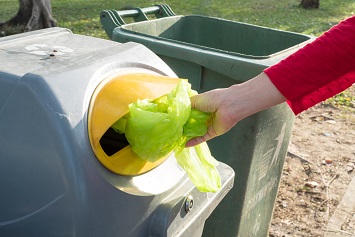New York State Supreme Court Justice Gerald W. Connolly released his decision on August 20, 2020, upholding New York’s Department of Environmental Conservation’s (DEC) right to enforce the state’s ban on single-use plastic shopping bags.
The lawsuit, Poly-Pak Industries, Inc., et al. v. The State of New York, et al., alleged that the Bag Reduction Act New York state made effective in March 2020 was unconstitutional. The Act prohibited certain entities from distributing any plastic carryout bags, subject to limited exceptions.
The decision also threw out the state’s regulation on the minimum thickness allowed on plastic bags, which had been set at 10 one-thousandths of an inch (mils). California’s minimum thickness was set at 2.25 mils.
Connolly agreed with the petitioners that the DEC went beyond its authority in setting a minimum thickness for allowed plastic bags and determined that this regulation was “invalid.”
All parties impacted by the ruling, including environmental groups, the state, plastic bag manufacturers, and business, believe the judge’s ruling is a win, with business and industry highlighting the portion of Connolly’s decision related to invalidating the minimum thickness requirement.
“The court’s decision is a victory and a vindication of New York State’s efforts to end the scourge of single-use plastic bags and a direct rebuke to the plastic bag manufacturers who tried to stop our law,” DEC Commissioner Basil Seggos said in a statement.
“This is a slam dunk victory for New York’s environment. New Yorkers use a staggering number of plastic bags—23 billion each year. It is terrific that New York’s plastic bag ban was upheld and that the court rejected the loophole that would have allowed for stores to hand out thicker plastic bags, almost defeating the original purpose of the law. Once fully implemented, New Yorkers will see less plastic bag litter in our communities, parks and waterways,” said Judith Enck, president of Beyond Plastics and former EPA regional administrator, in a news release on earthjustice.org.
Legislative Clarification Needed
In his decision, Connolly also wrote, “ … [T]he portion of the Bag Regulations allowing for use of certain plastic reusable bags is in plain contradiction of the Bag Reduction Act is further borne out by the legislative history herein” and that it is up to the legislature “to enact legislation to the extent is seeks to expand the list of ‘exempt bags’ (as defined in the statute) or provide DEC such authority.”
“Unfortunately, we are back where we started, and New York’s bag ban is still broken,” Zachary Taylor, director of the American Recyclable Plastic Bag Alliance, said in a statement. “If there is one thing that is very clear from the judge’s ruling it’s that New York has an unworkable plastic bag law and it must be fixed.”
The judge’s ruling eliminating the use of the thicker plastic bags means only paper or cotton bags will be allowed.
In his ruling, Connolly wrote, “The Bag Regulations contradict the Bag Reduction Act to the extent that they create an additional exemption for certain ‘non-film plastic washable material’ from the Bag Reduction Act’s ban of any plastic carry out bags. According to the Bag Reduction Act, a ‘reusable bag’ is defined as one ‘made of cloth or other machine washable fabric that has handles or … a durable bag with handles that is specifically designed and manufactured for multiple reuse’ (ECL §27-2801(4)), and such term is only used in the Bag Reduction Act concerning a municipalities ability to use portions of the paper carryout bag reduction fee for purchase and distribution.”
“Saying ‘plastic’ is like saying ‘metal’ when you’re referring to aluminum, and that’s where the issue comes in,” said Matt Seaholm, vice president of government affairs for the Plastics Industry Association and former executive director of the American Recyclable Plastic Bag Alliance.
The DEC is “reviewing the court’s decision to determine any potential impacts to implementation of the law and regulations,” Seggos said.
Although the law banning the use of single-use plastic bags became effective in March, the state has yet to enforce it due to COVID-19 and the pending litigation. Now, with the court’s published decision, the DEC said it will soon provide the required 30-day notice to businesses and stores and begin to enforce the ban.
The plastic bag industry believes the judge’s ruling points to a need for the state legislature to amend the law.
Most reusable bags have some sort of plastic component, such as nonwoven polypropylene, polyester, and nylon, Seaholm said.
“If they’re going to go through with a ban, there still needs to be a legislative fix, and that’s what the judge said,” he noted. “Or they can go forward with enforcing the law as it will now stand, and stores will have no bags to use.”
Environmental groups have a different interpretation of the ruling and are excited that the law can now begin to be enforced. New York was the second state in the United States—after California—to ban single-use plastic bags. Since New York passed the bill, similar laws have been passed in Connecticut, Delaware, Maine, Oregon, and Vermont.
“Today’s decision is a critical win for the fight against plastic bag pollution in New York,” Liz Moran, environmental policy director for the New York Public Interest Research Group, said in a statement.
Not all plastic bags are banned from the state. Trash bags; food carryout bags; dry-cleaning bags; and smaller bags for deli meats, nuts, and fruits are still allowed.
Optional Paper Bag Fee
Cities and counties can choose to enforce a 5-cent fee for paper bags. All consumers, except those receiving U.S. Department of Agriculture benefits through the Supplemental Nutrition Assistance Program (SNAP) or Women, Infants, and Children (WIC) program, would be required to pay the fee for paper bags if they do not bring their own reusable bags.
Cities and counties opting to charge the 5-cent fee will contribute 3 cents per bag to the state’s Environmental Protection Fund, with the remaining 2 cents going toward a program to distribute reusable bags.
Food and plastic industry members say that using paper bags will cause an increase in costs to consumers because paper bags cost more.
“If the state moves forward with enforcing this broken law, businesses that are now spending more on PPE, safety protocols and other COVID-era requirements, could be put in an impossible situation of being required to provide bags they can’t get,” Taylor said. “We stand ready to assist elected officials in crafting a workable solution while not placing undue burdens on businesses that have been hit hardest by the pandemic.”
Environmental groups are not pleased that the paper bag fee is optional for city and county governments. They claim not having any fees will just result in paper bag litter instead of single-use plastic bag litter.
“The state should have learned from other areas that also only banned plastic bags without a paper bag fee—they just don’t work,” the New York Public Interest Research Group wrote in a statement.
Businesses violating the ban on single-use plastic bags will first receive a warning, then a civil fine of $250 for the first violation and $500 for additional violations within the same year.


